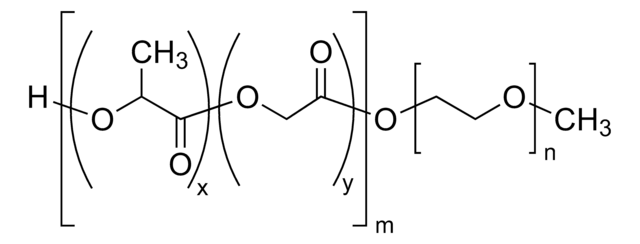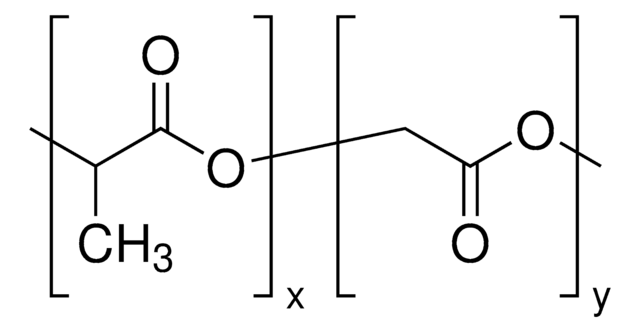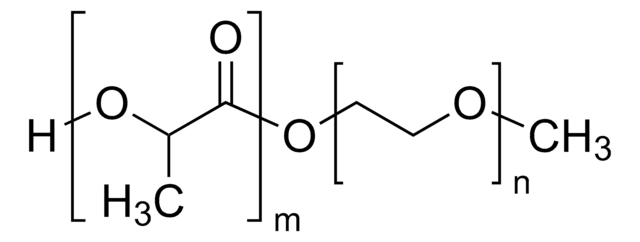764825
Poly(ethylene glycol) methyl ether-block-poly(lactide-co-glycolide)
PEG Mn 2,000, PLGA Mn 4,500
Sinónimos:
PEG-PLGA, Polyethylene glycol, mPEG-b-PLGA
About This Item
Productos recomendados
formulario
pellets
Nivel de calidad
cociente alimentación
lactide:glycolide 65:35
mol peso
PEG Mn 2,000
PLGA Mn 4,500
average Mn 6,500 (total)
marco temporal de la degradación
1-4 weeks
temperatura de transición
Tm 241-246 °C
PDI
≤2.0
temp. de almacenamiento
2-8°C
¿Está buscando productos similares? Visita Guía de comparación de productos
Descripción general
Aplicación
Características y beneficios
- Good biocompatibility, low immunogenicity and good degradability.
- Properties can be easily modulated by changing the block copolymer segment sizes to suit a particular application.
Código de clase de almacenamiento
11 - Combustible Solids
Clase de riesgo para el agua (WGK)
WGK 3
Punto de inflamabilidad (°F)
Not applicable
Punto de inflamabilidad (°C)
Not applicable
Elija entre una de las versiones más recientes:
¿Ya tiene este producto?
Encuentre la documentación para los productos que ha comprado recientemente en la Biblioteca de documentos.
Los clientes también vieron
Artículos
One of the common difficulties with intravenous drug delivery is low solubility of the drug. The requirement for large quantities of saline to dissolve such materials limits their clinical use, and one solution for this problem that has recently generated interest is the formation of drug-loaded micelles.
Local delivery of bioactive molecules using an implantable device can decrease the amount of drug dose required as well as non-target site toxicities compared to oral or systemic drug administration.
Microparticle drug delivery systems have been extensively researched and applied to a wide variety of pharmaceutical and medical applications due to a number of advantages including injectability, local applicability to target tissues and sites, and controlled drug delivery over a given time period.
Professor Nicola Tirelli (Istituto Italiano di Tecnologia, Italy) highlights the microfluidic-assisted method for fabricating well-defined and reproducible nanoparticles for drug delivery research.
Nuestro equipo de científicos tiene experiencia en todas las áreas de investigación: Ciencias de la vida, Ciencia de los materiales, Síntesis química, Cromatografía, Analítica y muchas otras.
Póngase en contacto con el Servicio técnico





